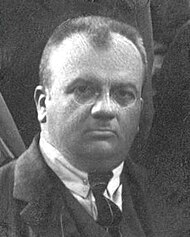Tadeusz Lehr-Spławiński
| Tadeusz Lehr-Spławiński | |
|---|---|
 |
|
| Born |
20 September 1891 Kraków |
| Died | 17 February 1965 (aged 73) Kraków |
| Nationality | Polish |
| Notable works | O pochodzeniu i praojczyźnie Słowian (On the origin and early homeland of the Slavs) |
Tadeusz Lehr-Spławiński (September 20, 1891 – February 17, 1965) was a Polish linguist, scholar, professor of Slavonic studies and twice elected rector of the Jagiellonian University in Kraków before and after the Nazi German occupation of Poland.
Lehr-Spławiński was born in Kraków, the son of Edward Lehr, an engineer, and Maria née Spławińska. He went to Jan III Sobieski high school and, in the years 1909–1915 studied linguistics, history of Polish literature as well as classical philology, at the Jagiellonian University in Kraków. He continued his studies in Vienna, and began his teaching career in Zakopane.
In 1918, Lehr-Spławiński became the professor at Poznań University and since 1922, the University of Lwów (following Poland's return to independence). He led the Departments of Slavonic Philology there. From 1929 until his retirement in 1962, he was a professor of linguistics at Jagiellonian University, elected as its Rector for the first time just prior to the Nazi German invasion of Poland. Among his students, from October 1938 was the 18-year-old Karol Wojtyła, future Pope John Paul II.
On November 6, 1939 during the notorious Sonderaktion Krakau, Lehr-Spławiński was arrested and interned by the Gestapo on the order of SS-Obersturmbannführer Bruno Müller; along with 184 professors and academics from three different universities in Kraków. It was part of a much broader assault on Polish cultural elite known as Intelligenzaktion devised by Hitler himself. The prisoners were transported first to jail at Montelupich street and – some three days later – to the detention center in Wrocław (German: Breslau), where they spent 18 days in prison facilities. The Breslau Gestapo were unprepared for such a large transfer of prisoners and awaited permission to send them to the Buchenwald concentration camp. As the camp was filled to capacity, on the evening of November 27, 1939 they were loaded on a train to the Sachsenhausen concentration camp located outside of Berlin.
...
Wikipedia
